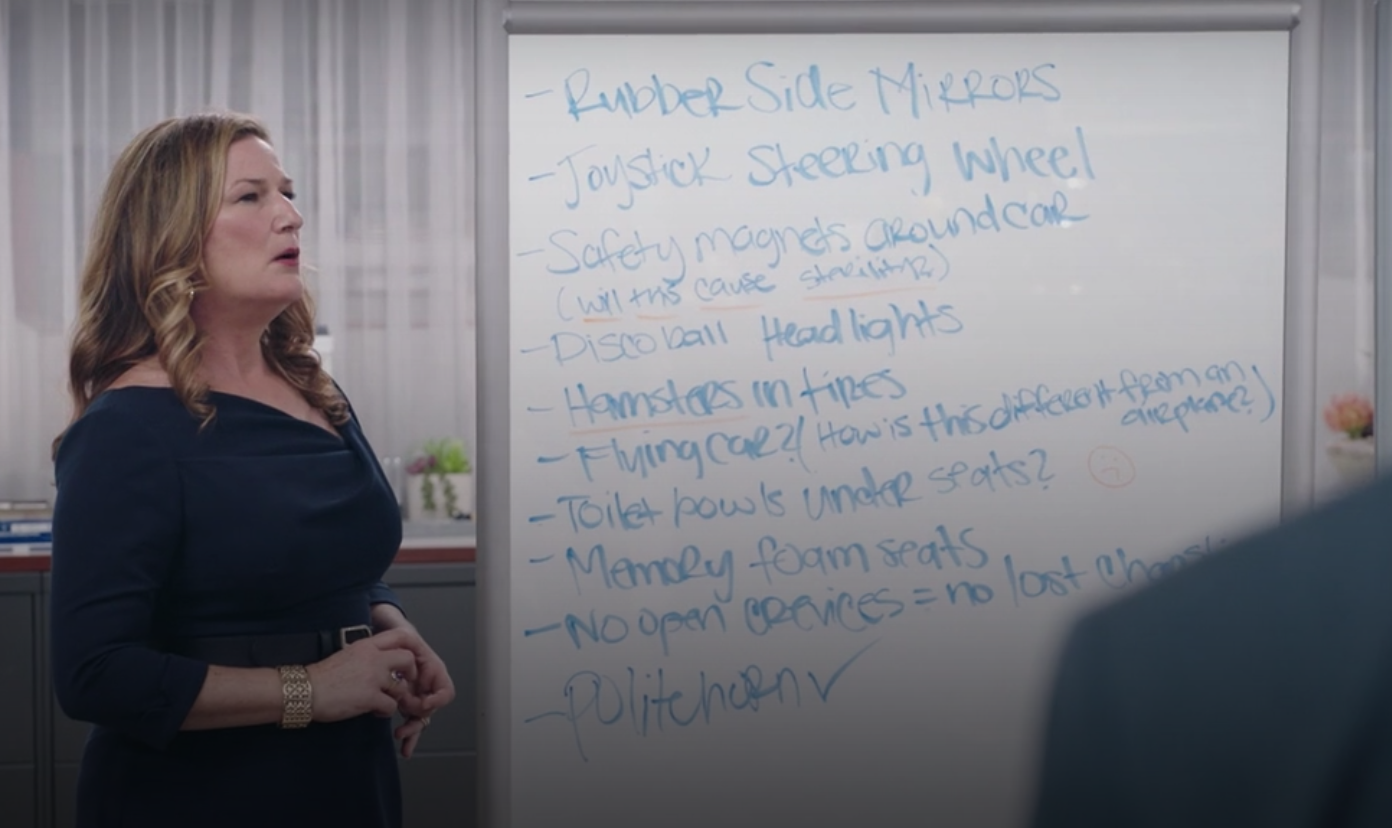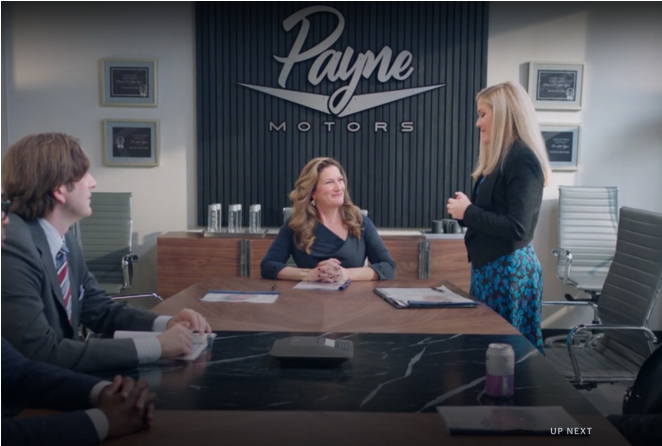A couple weeks ago, NBC quietly released a sneak peek of its new workplace sitcom about executives at a fictional Detroit automaker, creatively named American Auto, ahead of a Jan. 4 premiere.
Spoiler alert: it makes almost no mention of the national traffic violence epidemic, or climate change, or any of the other destructive externalities of the car industry.
Of course, this isn't much of a shocker — and not just because creator Justin Spitzer essentially picked the setting for his new show out of a hat when it entered development in 2013, in hopes it would suffice as a general stand-in for Corporate America at large. Car culture is so deeply infused into American culture that its most prominent side effects — 40,000 preventable deaths a year, impending planetary collapse caused in large part by tailpipe emissions, etc. etc. — are so broadly normalized that pop culture rarely acknowledges their existence, or at least fails to connect those horrors to the companies that knowingly perpetuate them.
Still, there's something uniquely cringeworthy about watching a network TV show fail to do this a solid broadcast hour, with more episodes to come — particularly because it's not very funny.

The general premise of American Auto, even on paper, is pretty gross. The show follows a rag-tag band of (checks notes) highly paid executives at the fictional Payne Motors, which the showrunner says has nothing to do with Ford Motors, despite repeated jokes about it being founded by an antisemite roughly 100 years ago.
Ex-pharmaceutical executive, Katherine Hastings, played by SNL alum Ana Gasteyer, has just been appointed as Payne's new CEO, despite not even knowing how to drive (gasp!), and the fact that the scion of the family business, Wesley Payne (Jon Barinholtz), is clearly gunning for the job. Wesley is now a consultant for the company, and he's among the half-dozen staffers who inexplicably shadow Hastings at literally all times, despite the fact that most of them have important-sounding jobs, like "head of the legal division" and a "chief auto designer." Sure!
In the two first episodes, we follow this Scooby-Doo gang as they solve a series of corporate conundrums, including completely re-designing and manufacturing the prototype for an autonomous vehicle in less than five hours, and navigating the PR fall-out from an O.J. Simpson-esque chase between the police and a serial killer driving one of their minivans.
Spitzer and his co-writers aim for a network-friendly version of edgy shock-comedy in their scripts, including a long riff on a "racist" AV that fails to recognize a Black pedestrian on a test track, before fixing the problem off-screen in a matter of hours, just in time for the big auto show. (In real life, of course, top engineers still haven't quite figured that one out.) The serial killer plot line, meanwhile, prompts the team to swiftly build a "murder-proof car," complete with a rear-windshield LED display that an abduction victim can activate from inside a trunk to notify passerby to call the police. (Murderers who would use the car itself as a weapon, naturally, are not mentioned as an area of urgent concern.)
Those jokes, on their own, will probably prompt a collective sigh among street safety advocates, even if they may also solicit a compartmentalized chuckle or two. But what's more troubling about American Auto is its overall subtext, which keeps signaling that the writers find the product at the center of their show utterly innocuous, rather than a leading cause of death in the United States.
Payne Motors' head auto designer, Cyrus (Michael Benjamin Washington), demos an unconventional safety feature
It's hard to imagine, for instance, that NBC would have greenlit a prime-time comedy set in Hastings' former workplace: a fictional pharma company that produces pain medications, which Wesley proudly announces he "used to snort." The national opioid crisis has claimed the lives of over a million Americans since 1999, leaving millions more devastated families in its wake; while a single throwaway joke might fly, it's borderline unthinkable that a major network would think the architects of that epidemic would be a fitting subject for a zingy sitcom, unless it was given a black comedy treatment so dark as to be unmistakably and intentionally treading on taboos.
The national traffic violence crisis, by contrast, killed 801,368 U.S. residents over the same period, and globally, 1.35 million people lose their lives in car crashes every year. But because roadway deaths have become so deeply normalized in so much of the world — and certainly in America — NBC feels comfortable ordering a breezy satire of the companies that have knowingly abetted that bloodshed at every turn, complete with quirky subplots about office romances and co-worker shenanigans. Like the Dunder Mifflin Paper Company in The Office, the show where Spitzer started his TV career, Payne Motors is treated largely as a simple backdrop for a lovable cast of characters to get into comical scraps.
The paper industry, though, is not producing a product that is the leading killer of children in the U.S.
Here's the good news: there are still a few episodes left in American Auto's first season.
Perhaps as the series unfolds, the writers will satirize the darker parts of the auto industry, like their advertising campaigns that promote, and even provoke, reckless driving, or their profit-driven decision to virtually cease production on small cars and flood the market with large ones that they know are two to three times more fatal to vulnerable road users their might drivers strike. Maybe they'll even lampoon automakers' long history of fighting against stronger federal fuel economy and safety standards — or, if they're not afraid of a more nuanced critique, they'll take on Detroit's more recent embrace of new efficiency and safety technologies, once it became clear that neoliberal lawmakers would do everything they could to subsidize the mass adoption of new electric and autonomous cars, rather than centering their climate strategy around transit, biking and walking.
Let's be clear, here: a lot of Streetsblog readers would probably watch the hell out of a competent satire that understands the sheer absurdity and cruelty of the auto industry, and eviscerates it in the way it deserves. If American Auto becomes that show, we're all in.
But at least based on the first two episodes, the writers aren't interested in exploring the corrosive impact that American automakers actually have on the world — because there isn't much evidence they're even aware of it.







